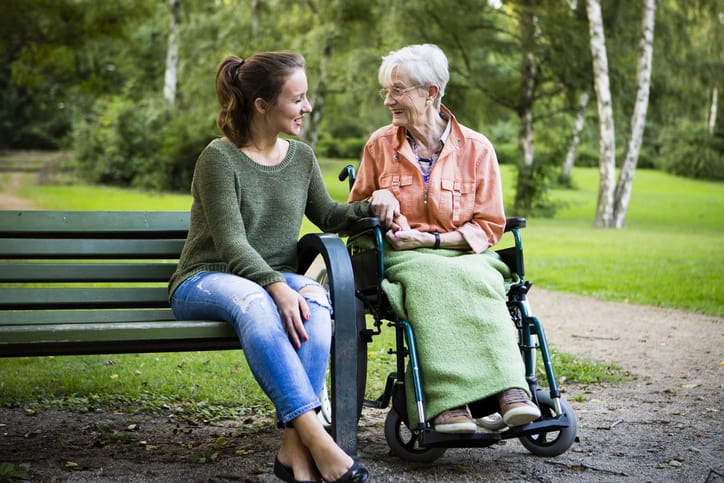As your parents grow older, you may find yourself facing a tough, emotional question: “How can I make sure companion care for the elderly for Mom and Dad are safe, happy, and not alone — even when I can’t be there every day?”
Many adult children walk this path. You want to respect your parents’ independence, but you’re starting to worry. Maybe your father, once vibrant and chatty, is becoming more withdrawn. Or your mother is skipping meals and not remembering to take her medication. The signs of aging are subtle at first — and then they seem to cascade.
If this sounds familiar, companion care might be the solution your family needs.
Unlike clinical in-home health care, companion care provides emotional support, social interaction, and gentle assistance with daily tasks, helping seniors live richer lives in the comfort of their homes or home care facilities.
In this article, we’ll explore five powerful reasons why families like yours are choosing companion care — and why it may be one of the best gifts you can give your aging parents.
What Is Companion Care for the Elderly?
Before diving into the benefits, let’s clarify what companion care for the elderly actually involves.
Companion care is a form of non-medical home care that focuses on:
- Social companionship and emotional support
- Light household tasks, such as laundry, meal prep, and tidying
- Assistance with errands and appointments
- Monitoring general well-being
- Helping maintain routines and hobbies
It’s not the same as skilled nursing or medical home health care. Companion caregivers don’t administer medications or provide hands-on physical care like bathing or wound dressing. However, they play an equally critical role in a senior’s overall health by supporting their emotional well-being, safety, and independence.
1. Emotional Support to Combat Loneliness
Loneliness is a health crisis — especially for seniors.
According to the CDC, nearly one in four adults aged 65 and older is considered socially isolated. Studies show that loneliness can increase the risk of:
- Depression and anxiety
- Cognitive decline (including Alzheimer’s and dementia)
- High blood pressure and heart disease
- Premature death
Your parents may not say they feel lonely — but if they’ve lost close friends, no longer drive, or spend most days alone, chances are they’re missing connection.
How Companion Care Helps:
Daily or weekly conversations to break up long days
Engagement in games, crafts, or hobbies they used to love
Walks and fresh air — because movement paired with conversation can lift mood
Celebrating small things like birthdays, holidays, or just sharing a meal
A companion becomes more than a helper — they become a trusted friend, especially for seniors whose children live far away or have demanding schedules.
“My mom laughs again,” one daughter said after hiring a companion caregiver. “She bakes again. She’s not just passing time anymore — she’s living again.”
2. Encouragement of Independence Through Gentle Assistance
As a loving son or daughter, you want to protect your parents. But here’s the challenge: they don’t want to feel like they’re losing control of their life.
That’s where companion care excels — it walks the line between helping without hovering.
Benefits of Companion Support for Independence:
- Assists rather than takes over: helping fold laundry with your parent, not for them
- Encourages small wins: like setting up a pill organizer, not administering the pills
- Promotes movement and routine, reducing risk of mental and physical decline
- Avoids over-medicalization, which can make seniors feel like patients rather than people
This balance is crucial. Your parents maintain a sense of autonomy while you gain peace of mind knowing they’re supported and watched over.
3. Peace of Mind for Adult Children
Let’s be honest — even if your parents are doing “fine,” you’re probably carrying low-level anxiety all the time. That sense of:
“Did Dad remember to eat lunch?”
“Is Mom still wearing the same clothes as yesterday?”
“What if something happens and no one’s there?”
Companion care takes that burden off your shoulders.
What You Gain:
- Regular updates from the caregiver — many services provide logs or check-ins
- Fewer emergency calls or surprise crises, thanks to consistent support
- Freedom to enjoy visits as a daughter or son, not just a caregiver
- Restored balance in your own work, marriage, and mental health
“Before we hired a caregiver, I couldn’t sleep well. I’d wake up worrying. Now I know someone is checking on Mom every afternoon, and I can breathe again.”
4. Support With Daily Routines Without Overstepping
Many seniors struggle not because they’re entirely incapable — but because the little things start slipping:
- Dishes pile up
- Mail gets ignored
- Groceries run low
- Meals get skipped
Over time, these small gaps lead to larger health risks like malnutrition, falls, or infections.
How Companion Care Fits In:
A companion caregiver can help your loved one:
- Prep simple meals together — encouraging eating and nutrition
- Keep the living space tidy and safe — reducing fall hazards
- Help with calendar reminders for doctor appointments
- Stay on top of household needs, such as shopping lists or mail sorting
Importantly, they do this without making your parents feel helpless. Instead, it’s “doing life together” — a model that respects dignity and encourages participation.
5. Early Detection of Health or Behavior Changes
Sometimes, it’s hard to notice changes in your parent’s behavior when you’re not there every day. A slight shift in mood, appearance, or hygiene might go unnoticed — until it becomes serious.
Why Companion Care Is a Frontline Defense:
- Caregivers notice subtle shifts — skipped meals, forgetfulness, withdrawn behavior
- They document or report concerns to family or case managers
- You get early alerts, which can lead to timely doctor visits or interventions
- Prevention is possible, and small actions can avoid bigger problems
A caregiver might say, “Mrs. Ellis hasn’t been herself this week.” That simple note could be the clue that leads to an early diagnosis — or prevents a hospitalization.
How to Choose the Right Companion Care Provider
You’re not just hiring help — you’re trusting someone to become part of your parent’s life.
Here’s What to Look For:
✅ Licensed and bonded agency
✅ Caregiver background checks and references
✅ Flexibility of hours and visit schedules
✅ Compatibility match (personality and interests matter!)
✅ Training in dementia, mobility support, or communication skills
✅ Clear communication with families — reports, texts, calls
✅ Trial visits or meet-and-greet options
Questions to Ask Agencies:
“Can my parents meet the caregiver first?”
“What happens if we want to switch caregivers?”
“Do you offer flexible care plans (e.g. 2–3 hours, a few times a week)?”
“How do you handle emergencies or concerns?”
Conclusion: Give Your Parent the Gift of Companionship and Care
Hiring a companion caregiver isn’t about stepping back — it’s about stepping up with love, intention, and support.
It means:
- Protecting your parent’s emotional well-being
- Helping them stay independent
- Avoiding crises before they begin
- Reducing your own stress and guilt
- Creating a better, fuller life for someone you love deeply
At the end of the day, companion care is about connection. It’s about making sure your parents are not just alive — but truly living.
So if you’ve been wondering whether it’s time to explore care options, consider this your sign.
“It’s the best decision we made,” many families say. And you might say the same.

